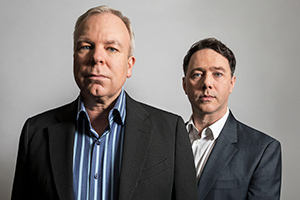Series 5 interview
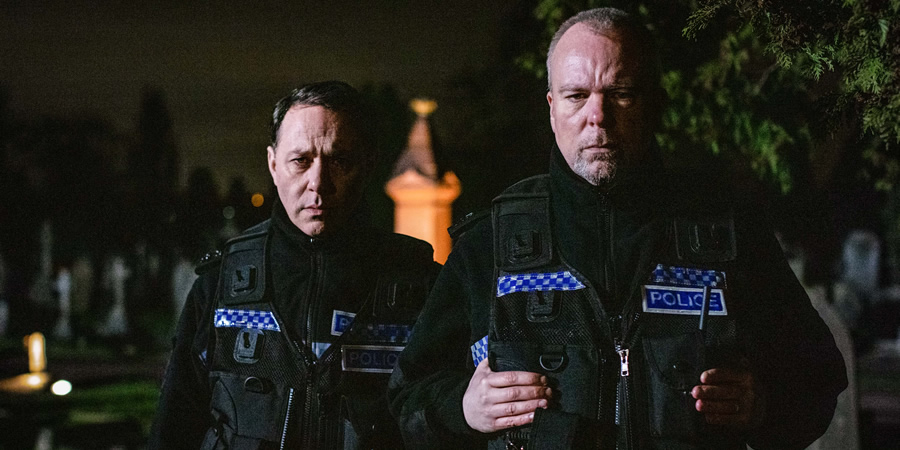
Series 5 of the multi-award winning Inside No. 9 starts on Monday 3rd February. Writers and stars Reece Shearsmith and Steve Pemberton and producer Adam Tandy talk more here...
Should we expect lots of varied episodes in the forthcoming series?
Reece: It's the most varied series we've done, I think.
Steve: We always aim to have varied episodes. We have some great episodes and some real good surprises. Each time we finish a series, you look back and you kind of go 'Where did that come from?', with no memory of creating it...
Over the last couple of years more people are coming to the show, and more people are talking about the show...
Adam: We were blessed with having the whole series box-setted on iPlayer just before Series 4 went out and I think that was a huge wakeup call, as people started recommending it... word of mouth... It built hugely and I think last season was the real breakthrough season with people who hadn't appreciated the show before; it certainly became a bigger thing.
When you sit down to plan a new series do you have ideas that have been previously put away or do you start with fresh every time?
Steve: We do start shuffling through the old books and seeing any scraps that we talked about and didn't necessarily go with. Sometimes an idea is great and you have it, but if it's similar to what you've already written you'll bank for a future series as you don't want too many of the same flavour in the same series. I think with this series, definitely two or three of them started with ideas that pre-existed.
The referee one [Episode 1 of Series 5] was a one-line idea that started with the notion of where it would be set and then the story grew from that. Once you start thinking about football and what are the stories to do with being a referee, the corruption, and what it's like from a personal point of view for those referees to live with the abuse. There were lots and lots of stories, and watching it back now I'm amazed how much we packed into 30 minutes actually.
Other ideas like The Stakeout [Episode 6] just came very late in the day and we were sent away with about two weeks to write a very simple, cheap episode. Ok, it wasn't that cheap, but it was simple. We just imagined two of us in a car and you can't leave this car, all the action happens in the car. We never go outside with the characters and so putting those parameters around it just makes you have to be more creative in your writing.
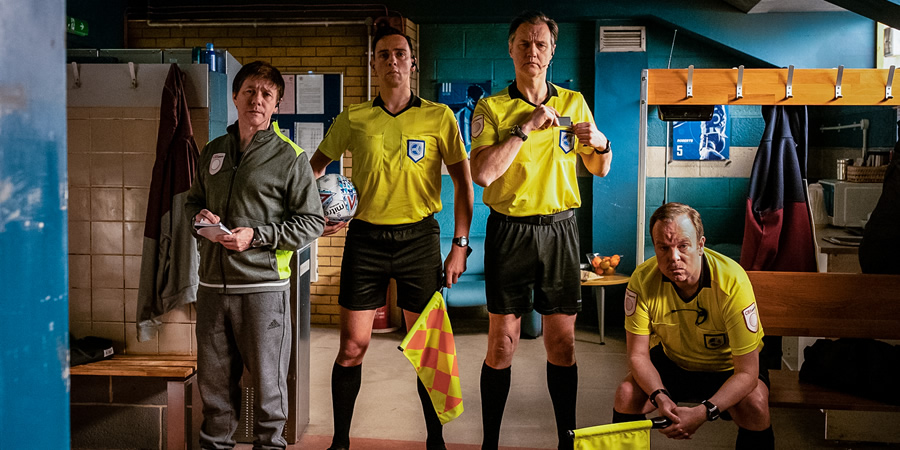
In terms of the football episode, when you're pulling something like that together, do you go away and talk to referees to find out what kind of stuff goes on in that space, or is it coming from your feelings and instincts?
Steve: It's a mixture really; we didn't actually speak to any referees but there's great podcasts and websites you can look at and interviews you can find, so we did do a lot of research for that one. The referees changing room is a space that probably most of us don't think about very often but it just struck us as a really interesting idea to set an episode there. It's very useful with Inside No. 9 to have a preordained structure, so the idea of 'before the game', 'halftime' and then 'after the game' gave you a really good structure for an episode, and that that felt really exciting.
When you're thinking about a new series, are you constantly on the go?... when you're in coffee shops or public spaces, watching people and thinking of ideas?
Reece: Yeah, there are lots of ideas and lines. Sometimes there's something we've not managed to fit into one thing and it will end up cannibalised and put into another. Nothing seems to be wasted.
Are a lot of episodes influenced by things that you see, or personal elements you've drawn on and woven into stories?
Reece: Sometimes. Steve was the driving force behind the football one, I just learnt it phonetically and it was absolute gobbledegook. In this series we've done one that's about magic and illusion and I wanted to explore that world. One of us will have more of an interest in one thing but we sit together and think 'What's a good story to spin out of this?' Sometimes it's personal, out of an interest in the world or it can be some weird little news report that you see and think is unbelievable.
Steve: We've got another episode in this series which is different kind of monologues, and one of the monologues is a YouTuber. That came across reading a news story about the girl who tried to blag a free hotel and just said 'You know me, I'm a YouTuber, give me everything for free.' So that sparked an interest and we've done a whole little YouTube section. So you learn about lots when doing this show!
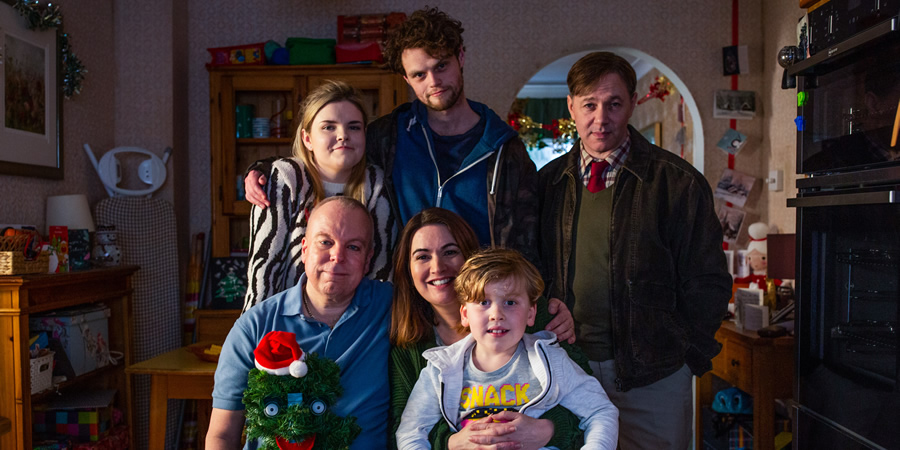
Would you ever revisit characters or storylines from past stories?
Reece: We would think about doing a sequel to one, if it was worth it. I'm afraid of being accused of running out of ideas if we did it, but if it was a good reason to return to something then that would be good.
As it is so established, do you get actors now lobbying for parts on it?
Steve: Yeah, definitely. David Morrissey had been saying to us for ages that he would love to be involved in it. Interestingly the referees and The Stakeout are the only two episodes we've written which are all male casts, and we've never really done that before.
It was interesting with 'Referees' because we didn't know which parts we wanted to play. Genuinely we could have played any of those roles within it. We just thought the main referee character would be a big leading man. I was doing Britannia with David at the time and was telling him about it and I could see a little glint in his eye.
Do you write the episodes and then take a character, or write them knowing who is going to play each character?
Steve: It varies, sometimes it's pretty obvious. If for example there's only two male characters and it's an either/or... we fall into reading it and settle into reading one character or the other. Then again, when you look at the whole series you might think 'you're playing two or three characters that are in the same vein, let's change things up a bit and I'll do that one instead'. We'll always have these conversations, and until all of the episodes are written and we start talking about casting, we don't preordain it.
Adam: And even then sometimes changes, on The Stakeout it was the other way around for a while but because Steve is the one who can drive, it switched.
Steve: In 'Referees', I just assumed Reece would be the grumpy vain one but Ralf Little ended up playing it and it was quite surprising that Reece played Brendan, but that's the joy of it!
Reece: We never think of the other actors, we just write it and then late in the day when you've got the opportunity to cast it, that's when you start thinking about it. I think you'd be very disappointed if you always had a person in mind and you couldn't get them - but mostly people say yes!
Would you like to direct another episode Steve?
Steve: I do direct an episode in this new series. The one with the monologues. It's more directing actors as opposed to directing cameras and I thought 'Yes, I can do that.' I really enjoyed it but it's a lot of pressure. Being in it and writing it, your mind is split so many different ways. We work with such fantastic directors; it was amazing to get Matt Lipsey back, having chased him for a while.
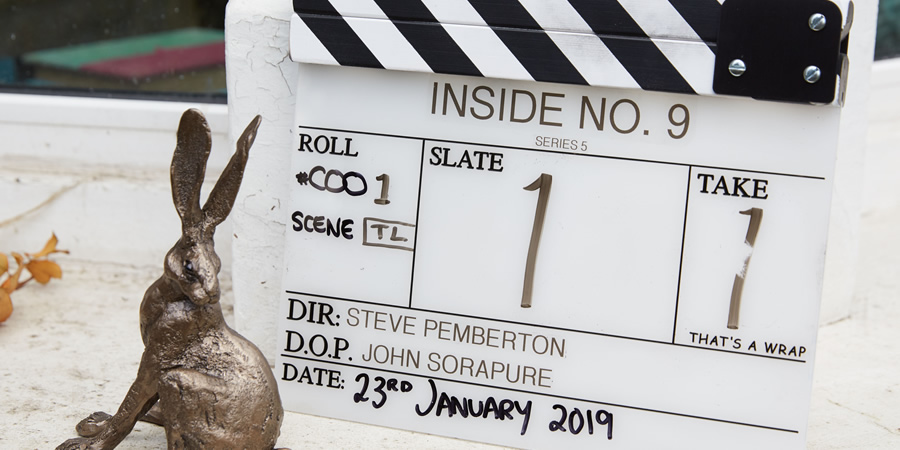
Is it difficult for a new director coming in... because you're writing, producing and acting in it and that's a very unusual situation for a director to find themselves in?
Reece: It could be if we were monsters but I think we're good at stepping back and just being actors in it, treating it likes it's their vision.
How much autonomy do you have over a series, in terms of output? Do the BBC come in and suggest a theme, or an actor, or is it all absolutely coming from you?
Adam: Shane [commissioner Shane Allen] is kind of like a super fan, he really doesn't want any spoilers, he doesn't even read the scripts!
The scripts are so tight and efficient, is there any scope for adlibs in the script or improvisations?
Reece: We would, but I think we are quite sticklers for thinking we've worked really hard on the words and so we're going to say them when we get to filming.
Steve: The episodes you'd call 'typical Inside No. 9s' are very, very heavily plotted. For one episode in the new series we've decided to go against that and do something a bit looser that wasn't about the twists but within a typical scene we would be open to improvising.
The scripts often sound like proper conversations; they're like conversations you would overhear and they're very intimate aren't they?
Steve: That's because we're actors, we are able to write thinking about the scenes from an acting point of view. We read them out regularly so we get a sense of how it sounds and how it feels, we're not just looking at how it looks on the page.
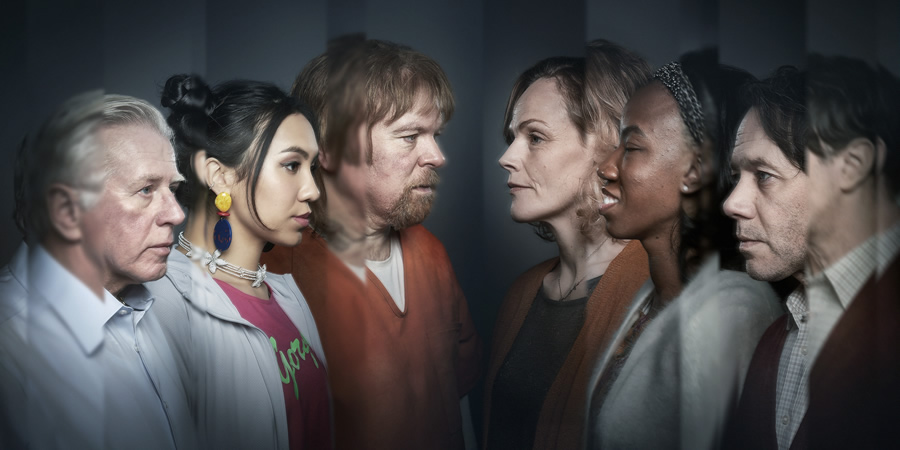
Do you discard much material?
Steve: In the early draft, possibly yes. Very often we have to cut a lot of dialogue out of the script. With The Stakeout there's a good five minutes gone.
Adam: Sometimes it develops and changes in rehearsals. In Bernie Clifton's Dressing Room there was the mime section with the coat and that was all worked out in rehearsals...
Steve: Yes, pretty much in rehearsal. We just put 'Some business here with a hat and a coat.' We try and aim for the right length because you don't want to film much more, as it can cause you a real headache. We don't send the scripts to Adam until we are really happy with them. We don't say 'Oh, he's a half-baked idea. See what you make of this.' They're pretty tight by the time we send them and then we only cut stuff out for time really.
As times gone on do you get more sensitive to anticipating how audiences will react, and learning how to work around that?
Steve: Very good question. Yes, we do. We always sit and think that even though we know what our story is or what our ending is, we never want you to get there before we want you to get there. So we always sit and say 'What do you think you're watching when you're watching this?' or 'Where do you think it's going?'
We plot out where we hope you think it's going, so that we can send you off down a false track and hopefully preserve a nice surprise. That's one of the joys of the series and one of the more difficult things as we write more and more episodes is to do that in different ways. I don't know if we're still succeeding, but that's the challenge we set ourselves.
When you're writing your episodes, do you start with knowing what the twist is and then work back to the story, or do you have the story in mind?
Steve: With 'Referees' it could have gone in so many different ways. If you're just enjoying the writing you don't always have to have the end in mind, but an episode like The 12 Days of Christine it's imperative that you have that in place because you need to very clearly work your way towards it.
We're not prescriptive, we try writing different ways and try out different stimuli for the writing and hopefully that allows the episodes to feel different and have different qualities. The one thing we try and do is always be in the same room and talk a lot before we start writing so we at least have some proper grounding of the world that that we're working in.
The show can shift between comedy, excitement, drama and of course has it's gothic elements. As it's the two of you writing, are each of you able to span all of those different qualities or is one of you slightly more gothic or more emotional?
Reece: We are so interlinked, it's really hard to feel like there's a strength in either one of us. We bat it around so much it ends up being completely scrambled eggs. I don't think one of us brings anything more than the other.
Steve: I wouldn't say so, we have a lot of similarities and we connect and overlap on so many things, we each have different subject matters or interests we might bring to it. Genuinely it's a really great working relationship.
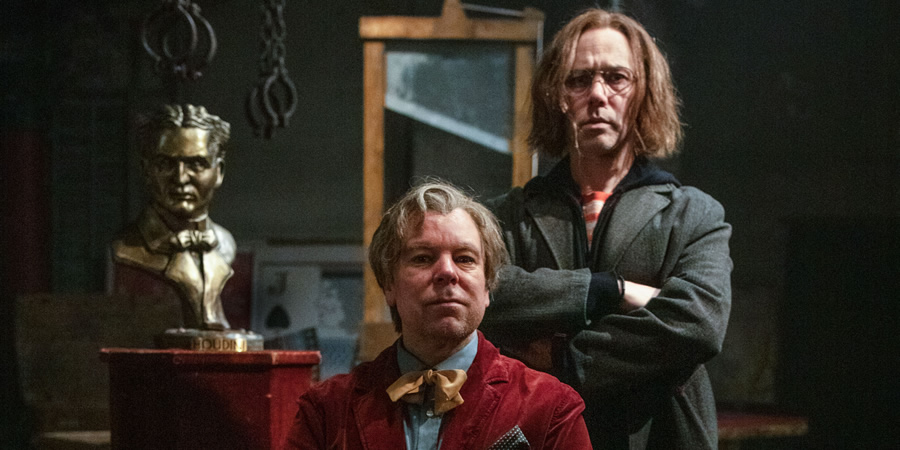
Is there any topic you would never make an episode of Inside No. 9 about, or is it open to anything?
Steve: I think it's open to anything. It's got to be inside a number nine in some way, we've got to shoehorn that element in. We wouldn't discount anything at all... the more outré and unexpected the better.
You've now got 31 episodes under your belt, that's a big body of work. Are there any that you feel proudest about?
Reece: It's hard; it's like choosing your favourite child! The ones that people like are the ones that make them cry, weirdly - it's not the comedy, it's the ones that move people.
I'm really surprised that Bernie Clifton's Dressing Room took such a grip on people. We thought it was a good one but we didn't think it would be so moving and heartfelt. It was a vehicle for me and Steve to do a two-hander, that's where it was born from, we had never done one where it was just us two.
Steve: The joy of Inside No. 9 is even half way through an episode you don't know if it's going to be a happy or sad or a funny one, and we really enjoy that about it. The whole ethos behind it is to never let the audience sit back and let it wash over them; you've got to engage with it.
Adam: The Stakeout episode starts as a police procedural and turns into something a little bit more sinister.
Have you thought about doing an Inside No. 9 film, or even a theatre show?
Steve: We haven't really talked about doing film just because, thankfully, they keep recommissioning the series. We really like the 30 minute format; I think it really suits us to not have to artificially bloat the story. It's punchy, and we enjoy that.
We certainly have talked about doing stage versions, whether it be pre-existing scripts or new ones. And possibly, I think that might be something we'll look at in the future.

